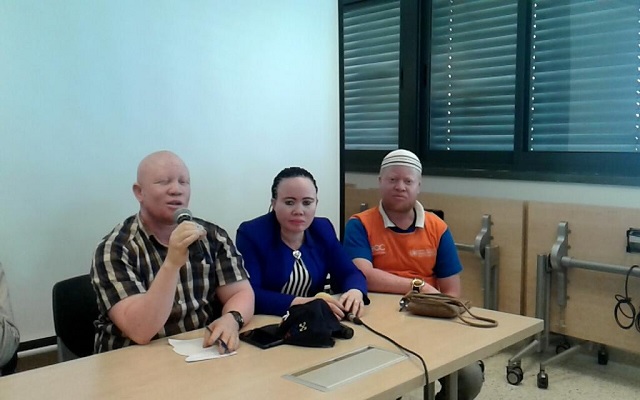
Kampala, Uganda | THE INDEPENDENT | The Uganda Cancer Institute on Thursday conducted free skin cancer screening for persons living with Albinism as Uganda joined the rest of the world to commemorate International Albinism Awareness day.
The Albinism Awareness day is commemorated on June 13 globally as part of the efforts to highlight the plight of persons living with Albinism.
Persons living with Albinism are at a higher risk of skin cancer due to exposure at to sun rays.
Dr. Noleb Mugisha an oncologist at the Cancer Institute says many of the Persons Living With Albinism tend to develop cancer of the skin because they lack melanin. Melanin is a natural pigment that gives your skin its color.
He explains that melanin helps the skin to be able to absorb sun rays but with people with albinism the skin is unprotected and therefore the cells are damaged leading to cancer.
“Even people without albinism can also suffer from skin cancer. If possible we should avoid exposing ourselves in the sun especially that sun between midday and 4pm. Those sun rays are very dangerous”
Mugisha warned saying people with the condition should never sun bath and always were long clothes to limit the chances of the rays to hit them directly.
Jude Sebyanzi one of the persons living with the genetic disorder said many of his colleagues who develop skin cancer have unnecessarily succumbed because of failure to access necessary treatment.
While the skin cancer program has been introduced for Persons Living Albinism many can not afford costs related to skin radio therapy. He said the clinic does not provide skin radiotherapy because of absence of a machine for skin cancer.
Claire Kyobe, the chairperson of the Uganda Albinism Association called upon those living with the disorder to do periodic checkups for cancer.
That way, she said policy makers will recognize how big the problem is among this group and allocate them funds for treatment and wellness.
“They can’t plan for us because they don’t know how big the problem is but I think skin cancer should be recognized as one of the commonest.people should come through and test. Then we will get figures to help us prove to government. They consider sun screens a cosmetic but to us its medicine”
In 2014, the General Assembly adopted resolution to with effect from 2015 mark June 13 Albinism Awareness Day worldwide as they were increasingly becoming endangered as some communities associate them with dangerous cultural myths.
For the last two years, parliament has been collecting funds to construct a rehabilitation facility for people living with the condition.
This year alone Shs42million was collected and the aim is to among others create more awareness especially on how to guard against skin cancer as majority of persons with albinism die from skin cancer between 30 and 40 years of age and yet it’s highly preventable with access to regular health checks, sunscreen, sunglasses and sun-protective clothing.
******
URN
 The Independent Uganda: You get the Truth we Pay the Price
The Independent Uganda: You get the Truth we Pay the Price





